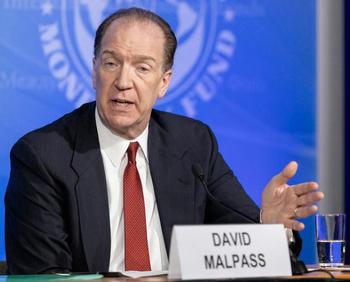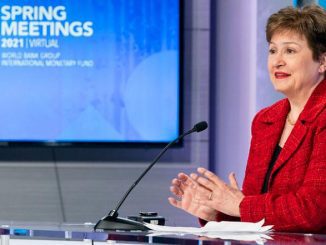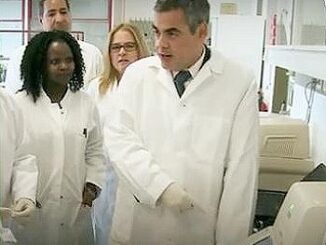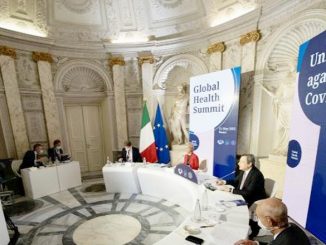
WASHINGTON, DC, May 20, 2020 (ENS) – The unprecedented coronavirus crisis the world is now going through could push 60 million people in developing countries into extreme poverty, the head of the World Bank Group warned today while announcing financial assistance to 100 of the poorest and most vulnerable countries.
“The pandemic and shutdown of advanced economies could push as many as 60 million people into extreme poverty – erasing much of the recent progress made in poverty alleviation,” World Bank Group President David Malpass warned Tuesday. “The World Bank Group has moved quickly and decisively to establish emergency response operations in 100 countries, with mechanisms that allow other donors to rapidly expand the programs.”

World Bank Group emergency funding to fight the coronavirus and the disease it causes, COVID-19, is being extended to 100 developing countries, home to 70 percent of the world’s population.
This assistance marks a milestone in implementing the World Bank Group’s pledge to make available US$160 billion in grants and financial support over a 15-month period to help developing countries respond to the health, social and economic impacts of COVID-19 and the economic shutdown in advanced countries.
Of the 100 countries that have had projects approved since March, 39 are in Sub-Saharan Africa. Nearly one-third of the projects funded are in fragile and conflict-affected situations, such as Afghanistan, Chad, Haiti, and Niger.
The Bank’s country operations are delivering help to the poorest families through:
* – cash transfers and job support
* – maintaining food security, nutrition, and continuity of essential services such as clean water and education
* – targeting the most vulnerable groups, including women and forcibly displaced communities, who are likely to be hit hardest
* – engaging communities to support vulnerable households and foster social cohesion
“To return to growth, our goal must be rapid, flexible responses to tackle the health emergency, provide cash and other expandable support to protect the poor, maintain the private sector, and strengthen economic resilience and recovery,” Malpass said.
The World Bank Group’s support through grants, loans, and equity investments will be supplemented by the suspension of bilateral debt service, as endorsed by the Bank’s governors.

The International Development Association, IDA, is the part of the World Bank Group that helps the world’s poorest countries. “The bilateral debt-service suspension being offered will free up crucial resources for IDA countries to fund emergency responses to COVID-19,” said Malpass.
“Nations should move quickly to substantially increase the transparency of all their governments’ financial commitments. This will increase the confidence in the investment climate and encourage more beneficial debt and investment in the future,” he said.
Disbursement is already underway on $20 million to Senegal and $35 million to Ghana, funding that will strengthen disease surveillance systems, public health labs, and epidemiological capacity for early detection.
A $20 million IDA grant was approved for Haiti that aims to enhance testing, minimize spread through contact tracing of confirmed cases, and provide laboratory and protective equipment for health care staff.
The World Bank Group is leveraging countries’ existing social protection systems to help families and businesses restore income, preserve livelihoods, and compensate for increasing prices and unexpected medical expenses. These safety nets will need to be augmented with safe, direct food distribution, accompanied by key information on nutrition, social distancing, and hygiene.
In Uzbekistan, a $95 million financing package includes funding for cash support to low-income families and one-off unemployment benefits, while in Tunisia $100 million is being reallocated from the existing portfolio to help finance additional social benefits and grants to small and medium-sized enterprises.
Other members of the World Bank Group – the International Finance Corporation, IFC, and Multilateral Investment Guarantee Agency (MIGA) – have also fast-tracked support to businesses in developing countries, including trade finance and working capital to maintain private sectors, jobs, and livelihoods.
The IFC continues to implement its $8 billion fast-track financing facility, which aims to keep companies in business and preserve jobs. Close to 300 clients have requested support, and the facility may be oversubscribed. Building on this effort and market demand, IFC aims to provide $47 billion in financing to developing countries over 15 months.
Cumulative COVID-19 related commitments under IFC’s Global Trade Finance Program, which supports small and medium-sized enterprises involved in global supply chains, have totaled 1,200 transactions across 33 countries for $1.4 billion, with 51 percent of this volume in low-income and fragile countries.
Procuring medical equipment and supplies for developing countries is one of the Bank Group’s most important functions. Many developing countries import most, and in some cases all, of the medical supplies critical for fighting COVID-19, leaving them extremely vulnerable to supply disruptions and export restrictions.
In Pakistan, the first consignments of personal protective equipment (PPE) – including masks, gloves, protective suits, gowns, coveralls, shoe covers, goggles, and face shields – have already been delivered to doctors and paramedics. This assistance is part of a larger package that includes $25 million for emergency cash transfers to poor and vulnerable households.
On April 23, the World Bank approved $100 million for the Philippines to procure materials including PPE, essential medicines, test kits, and key equipment such as mechanical ventilators, cardiac monitors, and portable x-ray machines.
In Iraq, the World Bank redeployed $33.6 million to help finance the supply of essential equipment and supplies and strengthen intensive care unit capacity at public hospitals.
The World Bank Group is helping countries access critically needed supplies and equipment, for example, by identifying interested suppliers and negotiating prices and conditions.
Another United Nations financial institution that is also helping developing countries through the coronavirus crisis is the International Monetary Fund, which is not part of the World Bank Group.

Still, the IMF is supplying financing to developing countries in need.
To mention just a few of the 50 countries that have received IMF financing in response to the coronavirus crisis, on May 15, the IMF Executive Board approved Jamaica’s request for emergency financial assistance of about US$520 million to help meet the urgent balance-of-payments needs stemming from the COVID-19 pandemic.
The Government of Jamaica has declared the entire island to be a disaster area and established a special taskforce to coordinate the country’s COVID-19 response and recovery efforts, with the objectives of minimizing the loss of human life and protecting livelihoods.
Tao Zhang, deputy managing director and chair of the IMF Executive Board, said, “The Jamaican authorities have proactively responded to the COVID-19 pandemic. Nevertheless, despite the authorities’ best efforts, the pandemic is severely impacting the Jamaican economy, as a sudden stop in tourism and falling remittances are generating a sizable balance-of-payments need. Moreover, the economic outlook remains subject to an unusually high degree of uncertainty. The disbursement … will strengthen reserves and help catalyze additional support from other international financial institutions and development partners.”
On May 6, the IMF Executive Board approved financing for Kenya under the Rapid Credit Facility equivalent to about US$739 million to help meet Kenya’s urgent balance of payments need stemming from the outbreak of the COVID-19 pandemic.
“The impact of COVID-19 on the Kenyan economy will be severe. It will act through both global and domestic channels, and downside risks remain large,” said the IMF Executive Board. “While the authorities have taken decisive action to respond to the pandemic’s health and economic impacts, the sudden shock has left Kenya with significant fiscal and external financing needs. Authorities have committed to resume their fiscal consolidation plans once the crisis abates to reduce debt vulnerabilities.”

And on May 11, Egypt’s request for emergency financial assistance of US$2.77 billion to meet the urgent balance of payments needs stemming from the outbreak of the COVID-19 pandemic was approved by the IMF Executive Board.
IMF Managing Director Kristalina Georgieva said, “This comprehensive package of financial support … [will] help strengthen confidence in the Egyptian economy, make further progress to protect the most vulnerable, and provide the basis for a strong economic recovery. It would also help accelerate Egypt’s reform efforts aimed to support broad-based, job-rich, and sustainable growth.”
Geoffrey Okamoto, first deputy managing director and acting chair of the Executive Board, said, “The COVID-19 pandemic has drastically disrupted people’s lives, livelihoods, and economic conditions in Egypt. The global shock has resulted in a tourism standstill, significant capital flight, and a slowdown in remittances, resulting in an urgent balance of payments need.”
Okamoto said, “As the crisis abates, measures to lower the debt level would need to resume along with continued implementation of structural reforms to increase the role of the private sector to achieve higher and inclusive private sector-led growth and job creation, unlocking Egypt’s growth potential and entrenching resilience.”
To date, the IMF has approved a Total Emergency Financing for COVID-19 of US$21,629.59 million. To track the IMF’s Emergency Funding and Debt Relief disbursements, visit the IMF lending tracker at: https://www.imf.org/en/Topics/imf-and-covid19/COVID-Lending-Tracker#ftn
Copyright Environment News Service (ENS) 2020. All rights reserved.
© 2020, Environment News Service. All rights reserved. Content may be quoted only with proper attribution and a direct link to the original article. Full reproduction is prohibited.



